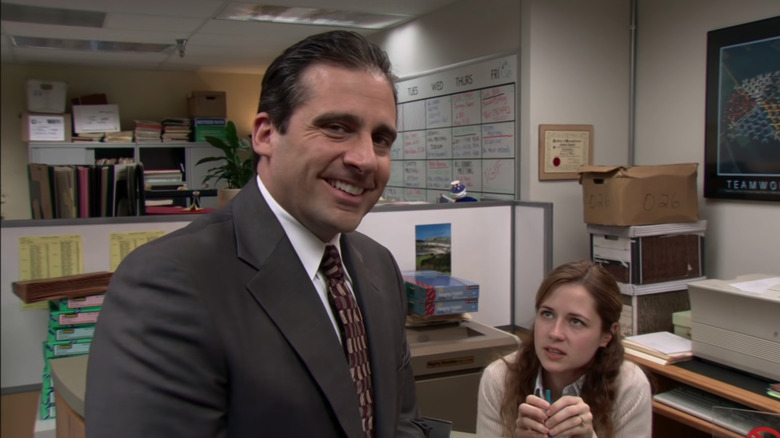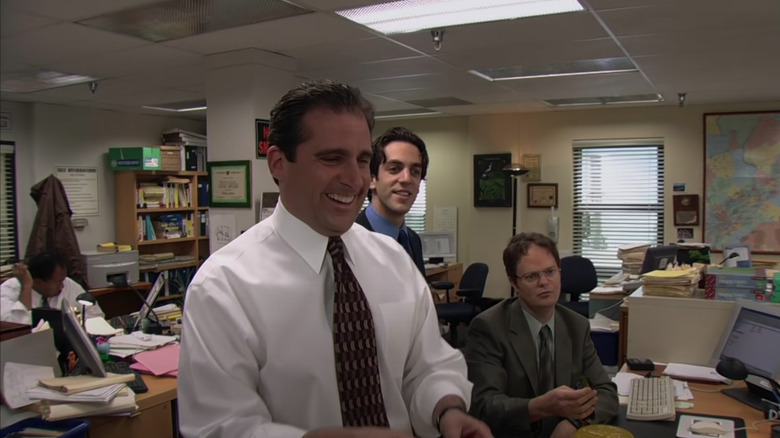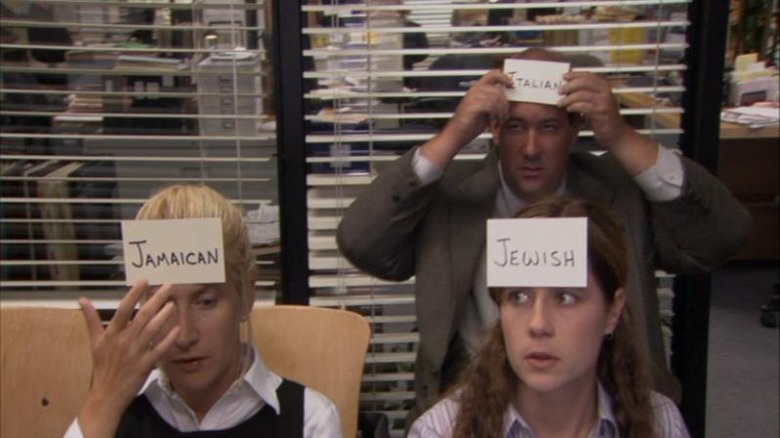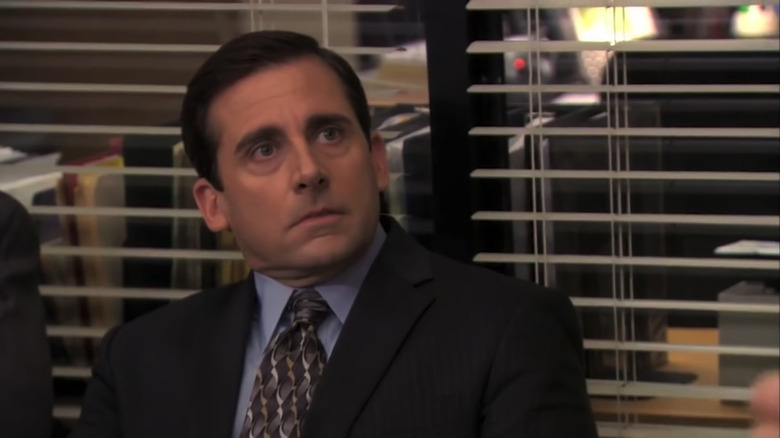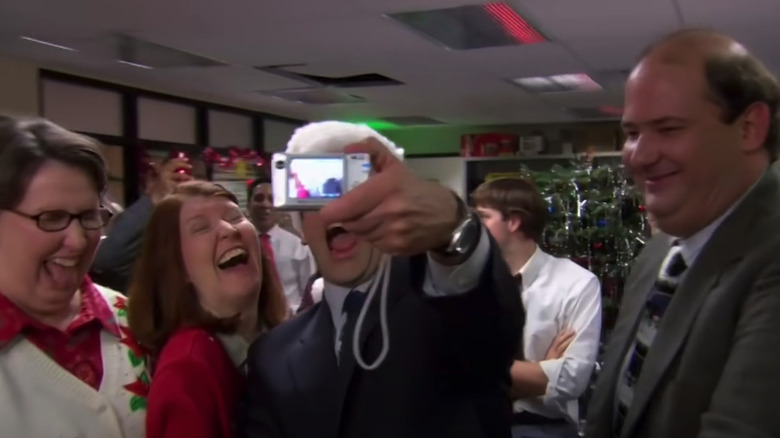How Steve Carell Makes Sense Of Michael Scott's Most Problematic The Office Moments
Comedy's a tricky genre. Sometimes, the jokes seem to come naturally. But other times, it's more effective to create a scene that's so cringe-worthy that tension builds until you can't help but laugh just to break it. Few shows execute the latter better than "The Office," especially when the self-proclaimed world's best boss, Michael Scott (Steve Carell), is on screen.
A bumbling and incompetent (yet well-intentioned) regional manager, Michael is the awkward heart and soul that drives the earlier seasons of the show, setting such a high standard that Carell himself is hesitant to return to the role. More often than not, Michael makes an idiot of himself — much to viewers' simultaneous amusement and horror. But there are more than a few times when the boss simply goes too far. Who could forget the sexual harassment training seminar that Michael hijacked, only to slut-shames the actress in the training video? Or when he took on a bandana-clad alter ego named "Prison Mike" to reassure the Dunder Mifflin employees that their jobs were far preferable to prison, only to single out a particular employee as "the belle of the ball" and warn him not to drop the soap?
Sure, Michael was a hilarious character, but sometimes he just seemed so out-of-touch that it's easy to question if some of his choices should have heftier repercussions. However, Carell has a simple way of looking at his character: intentions are key.
'He's trying, and he just has poor social skills'
Despite Michael's constant poor taste, it's always clear that he cares about his employees — something that Carell saw as a key redeeming feature even amidst Michael's biggest mistakes. In an interview with Mashable, the actor said:
"He's a person with an enormously good, kind heart who lacked a great deal of information about the world around him. ... [Michael's] trying his best! There's a difference between being intolerant and being ignorant. Sometimes intolerance and ignorance go hand in hand, for sure. But I think he was a very earnest and decent human being. He just didn't... get it all the time, you know?""
To its credit, "The Office" does go out of its way to show that Michael truly does care about his employees. He frequently interrupts what would otherwise be a relatively productive workday with antics that intend to improve morale or build team spirit, putting what he sees as a strong company culture above the company's actual success. He's also not afraid to stick his neck out on the line to protect employees, especially in the midst of corporate intervention. Yet that isn't always enough to redeem the contentious boss in some viewers' eyes.
When intent isn't enough
As important as it is to look at an individual's intentions when assessing their character, it's also a good idea to look at their response afterwards, along with any harm that they may have caused. With that in mind, Michael's infamous behavior in "Diversity Day," an episode in which he hijacks a diversity training seminar and proceeds to have everyone act out racial stereotypes, doesn't always meet the mark.
"Diversity Day" has been polarizing since its release in 2005, with viewers arguing about whether or not Michael's behavior is too offensive. In 2021, the episode made headlines again as it was cut from an American Comedy Central "The Office" marathon. However, independent fact checker Snopes noted that a number of episodes are also usually skipped during "The Office" reruns, so it's difficult to know if the omission was due to content concerns or simply logistical. Either way, the episode may be even more difficult to sit through thanks to its position in the show itself: "Diversity Day" was only the second episode in the series, and the first to be written for an American audience.
A mistake in characterization
The version of "The Office" starring Steve Carell is an American remake of a British sitcom by the same name, and despite the show's many eventual differences, their pilots were essentially the same. However, by episode two, the American script had been adjusted to better resonate with its audience, even if the show would take some time to find its footing. Unfortunately though, the pilot episode (and the British version of "The Office" in general) wasn't particularly kind to the boss: while Michael would eventually become known as a goofy, well-intentioned leader, his guitar-strumming UK counterpart David Brent was far less redeemable.
As a result, viewers didn't go into "Diversity Day" assuming that Michael meant well, making it all the more difficult to watch him breeze through a never-ending list of offensive comments. In comparison, when he hijacked a sexual harassment seminar in season 2, it was much easier to accept that, in a very misguided way, Michael was at least trying to foster what he saw as a fun workplace culture. Of course, this isn't to say that the two are perfectly analagous — especially since in "Diversity Day," Michael roped most of the staff into his antics as well. But the more we saw of Michael constantly trying to support his employees over the seasons, the easier it ultimately became to let things slide.
Making work entertaining
"The Office" had a difficult task: making a work environment, which most people absolutely dread, into something entertaining enough for viewers to willingly tune into at home. Ultimately, the show managed to work for the same reasons that Michael did — despite each character's quirks, it was rare for anyone to be actively malicious (unless you're uncharitable towards Jim's pranks).
That being said, the writers didn't always get it right. For instance, they had originally planned a scene where Jim (John Krasinski) would cheat on Pam (Jenna Fischer) as she was on maternity leave — major yikes. The storyline was only cut from the show because Krasinski refused to shoot it and claimed that fans would stop their support.
Ultimately though, despite any hiccups along the way, the characters in "The Office" come across as a ragtag group of employees, each of them respectable (okay, most of them respectable) despite their quirks. It's hardly a surprise that the show is still so popular to this day. Sure, it's about a workplace — a topic many people wouldn't want to return to during their free time. But that workplace is supportive, albeit dysfunctional — a welcome escape from many viewers' jobs, and, at times, a much needed fantasy.
